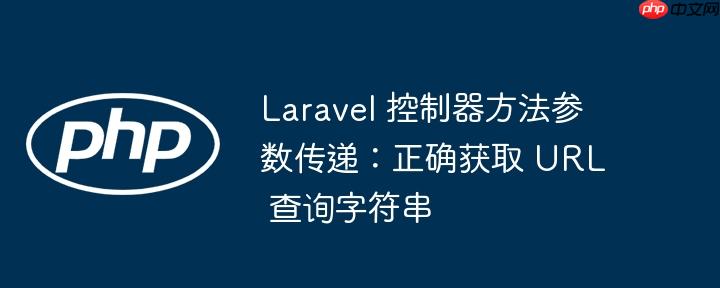
在构建 Web 应用程序时,经常需要从 URL 中获取动态数据,例如文章 ID、搜索关键词或特定操作的类型。在 Laravel 中,对于路由参数(如 /article/{id} 中的 {id}),框架会自动将其注入到控制器方法的参数中。然而,对于 URL 查询字符串参数(如 /article/{id}/like?type=heart 中的 type=heart),则需要使用 Laravel 提供的 Request 对象来访问。
假设我们有一个文章点赞功能,用户可以为同一篇文章点不同类型的赞(例如“心形”或“手指”)。前端 Blade 模板中的链接如下所示:
<a href="/article/{{ $article->id }}/like?type=heart" class="btn btn-primary">Like Heart</a>
<a href="/article/{{ $article->id }}/like?type=finger" class="btn btn-primary">Like Finger</a>对应的路由定义在 web.php 中:
Route::get('article/{id}/like', 'App\Http\Controllers\ArticleController@postLike');在 ArticleController 的 postLike 方法中,我们希望获取 type 参数的值(heart 或 finger),以便根据类型更新点赞状态。如果尝试使用 request('like') 或直接将字符串硬编码,将无法正确获取到 URL 查询参数 type 的值,导致功能异常。
Laravel 提供了 Illuminate\Http\Request 对象,它封装了当前 HTTP 请求的所有信息,包括查询参数、POST 数据、文件上传等。通过在控制器方法中进行依赖注入,我们可以轻松访问这个对象。
1. 导入 Request 类
在控制器文件的顶部,需要导入 Request 类:
use Illuminate\Http\Request;
2. 在控制器方法中注入 Request 对象
将 Request $request 作为参数添加到 postLike 方法中。Laravel 的服务容器会自动解析并注入当前请求的实例。
public function postLike($id, Request $request)
{
// 获取路由参数 $id
$article = Article::find($id);
// 从查询字符串中获取 'type' 参数
$type = $request->input('type'); // 或者 $request->query('type')
// 示例:使用获取到的 $type 参数进行逻辑处理
if (!$article) {
return response()->json(['message' => 'Article not found.'], 404);
}
// 检查用户是否已在今天对该文章的特定类型点赞
if ($article->hasLikedToday($article->id, $type)) {
return response()->json([
'message' => '您今天已经点赞过文章 #' . $article->id . ' 的 ' . $type . ' 类型。',
]);
}
// 设置点赞 Cookie
$cookie = $article->setLikeCookie($article->id, $type);
// 增加文章对应类型的点赞数
// 注意:原始代码中的 `increment('like_{$like}')` 存在变量插值问题
// 应改为 `increment("like_{$type}")` 或使用更安全的字段名
$article->increment("like_{$type}"); // 假设数据库字段名为 like_heart, like_finger 等
return response()
->json([
'message' => '成功点赞文章 #' . $article->id . ' 的 ' . $type . ' 类型。',
'cookie_json' => $cookie->getValue(),
])
->withCookie($cookie);
}代码解析:
为了教程的完整性,这里提供 Article 模型中的辅助方法,它们用于处理点赞逻辑:
// 在 Article 模型中
use Carbon\Carbon;
use Illuminate\Support\Facades\Cookie; // 确保导入 Cookie Facade
public static function hasLikedToday($articleId, string $type)
{
$articleLikesJson = Cookie::get('article_likes', '{}');
$articleLikes = json_decode($articleLikesJson, true);
if (!array_key_exists($articleId, $articleLikes) || !array_key_exists($type, $articleLikes[$articleId])) {
return false;
}
$likeDatetime = Carbon::createFromFormat('Y-m-d H:i:s', $articleLikes[$articleId][$type]);
// 检查点赞时间是否在今天之内
return !$likeDatetime->addDay()->lt(now());
}
public static function setLikeCookie($articleId, string $type)
{
$articleLikesJson = Cookie::get('article_likes', '{}'); // 默认值应为 {} 而非 []
$articleLikes = json_decode($articleLikesJson, true);
// 更新或添加指定文章和类型的点赞时间
$articleLikes[$articleId][$type] = now()->format('Y-m-d H:i:s'); // 使用 now() 获取当前时间
$articleLikesJson = json_encode($articleLikes);
return cookie()->forever('article_likes', $articleLikesJson);
}注意事项:
输入验证 (Validation): 在实际应用中,务必对从请求中获取的参数进行验证。例如,确保 type 参数是预期的值(heart 或 finger),而不是任意字符串。Laravel 提供了强大的验证功能:
use Illuminate\Http\Request;
use Illuminate\Validation\Rule; // 导入 Rule 类
public function postLike($id, Request $request)
{
$request->validate([
'type' => ['required', 'string', Rule::in(['heart', 'finger'])],
]);
$type = $request->input('type');
// ... 后续逻辑
}默认值 (Default Values): 如果某个查询参数可能不存在,但您希望为其提供一个默认值,可以在 input() 或 query() 方法的第二个参数中指定:
$type = $request->input('type', 'default_type');安全性 (Security): 始终假定所有用户输入都是不可信的。通过验证、过滤和适当的数据库操作(如使用 Eloquent 的 increment 方法),可以有效防止 SQL 注入和其他安全漏洞。
正确地从 URL 查询字符串中获取参数是 Laravel 开发中的一项基本技能。通过利用 Illuminate\Http\Request 对象并进行依赖注入,我们可以以一种优雅且安全的方式访问这些数据。结合输入验证等最佳实践,能够确保应用程序的健壮性和安全性。理解并掌握 Request 对象的使用,将极大地提升您在 Laravel 项目中的开发效率和代码质量。
以上就是Laravel 控制器方法参数传递:正确获取 URL 查询字符串的详细内容,更多请关注php中文网其它相关文章!

每个人都需要一台速度更快、更稳定的 PC。随着时间的推移,垃圾文件、旧注册表数据和不必要的后台进程会占用资源并降低性能。幸运的是,许多工具可以让 Windows 保持平稳运行。

Copyright 2014-2025 https://www.php.cn/ All Rights Reserved | php.cn | 湘ICP备2023035733号